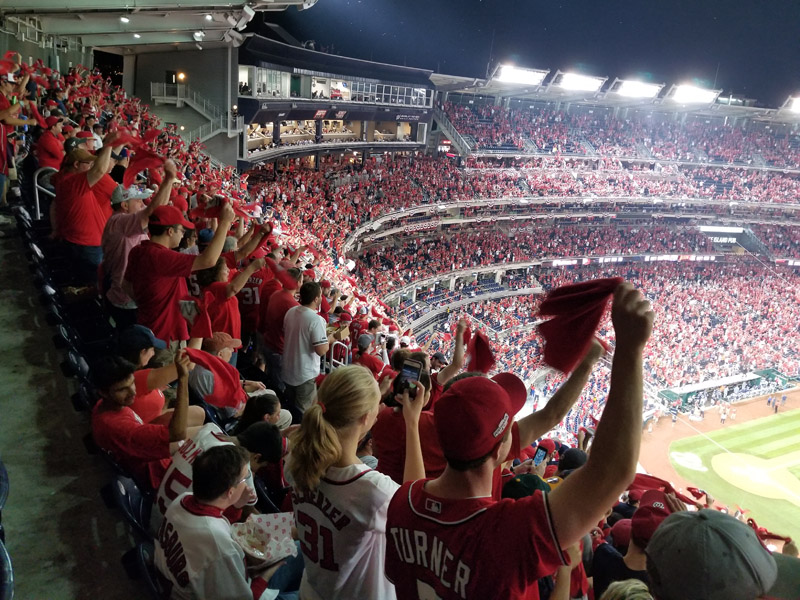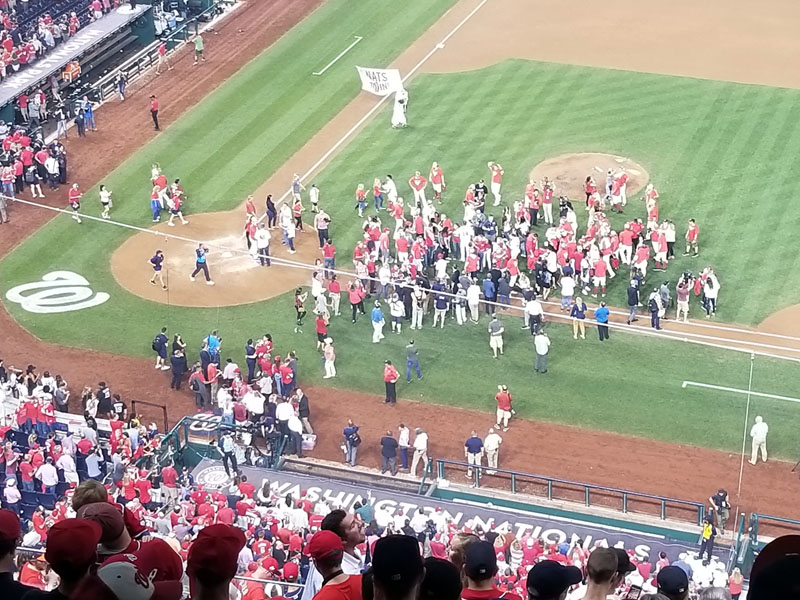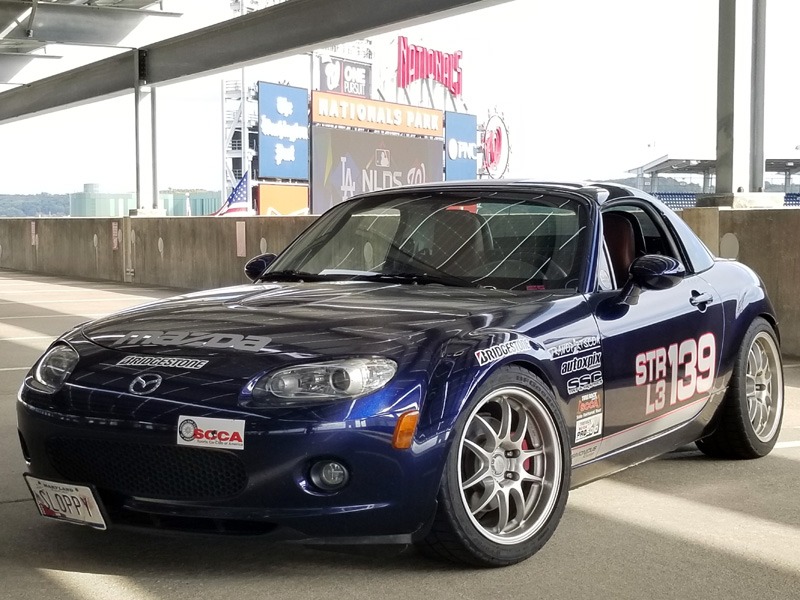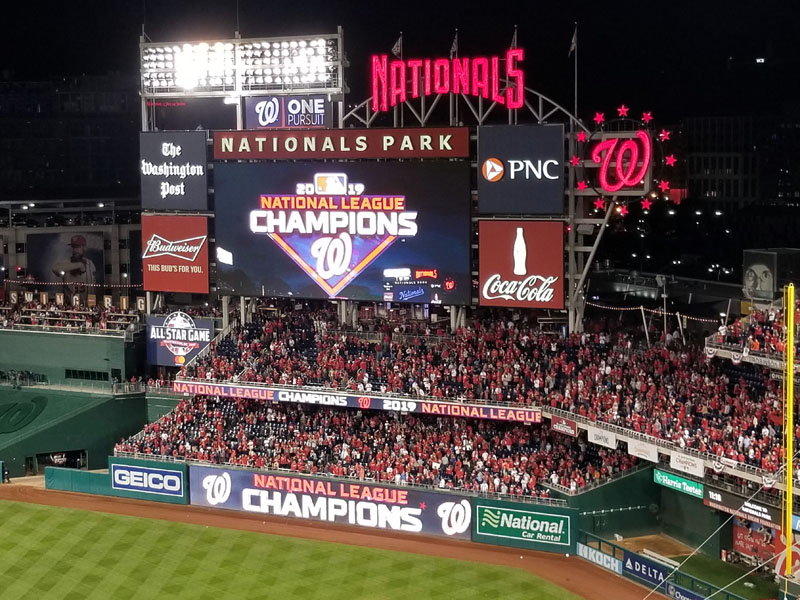Part 3: The Road to the World Series
When it comes to attending Nationals games, I consider them a "nice to do" rather than "must do." I've been to a bunch of regular season games, though usually only a few per year. We did Opening Day once, and I don't have to do that again. In previous playoff series, I was content to watch them on TV. I wasn't too interested in paying inflated prices or doing some mad scramble for a limited number of tickets.
Kate had a different idea, and said I should go to the wild card game. I resisted, but not vigorously. I figured the game would sell out quickly and, with neither of us wanting to wade into the waters of the secondary market, that would be that.
The only problem was that the game was not sold out. Again, I protested, since ticket prices for my usual nosebleed seats were double that of regular season games. But Kate said to go, so I got a seat in the very top row of section 420.
I expected a more electric atmosphere in the park when I arrived two hours before first pitch. That expectation was probably unrealistic considering the Nationals' previous playoff results. There also was the apprehension that, if the Nats prevailed on this night, their next opponent would be the Dodgers, which had dominated the National League West.
 We waved our red rally towels when prompted as the TBS broadcast started, but as I looked around the park, I saw more empty seats than I had liked. I wondered to myself how that might have looked on television. But for a not-quite-full stadium, it was loud as Max Scherzer took the mound.
We waved our red rally towels when prompted as the TBS broadcast started, but as I looked around the park, I saw more empty seats than I had liked. I wondered to myself how that might have looked on television. But for a not-quite-full stadium, it was loud as Max Scherzer took the mound.
Just a few pitches in, the Brewers put two runs on the board. In the second inning, a solo homer put the home team down by three. Were these the result of Max's occasional shaky start or did he just not have it tonight? Throughout the early innings, there was an unease in the park, though the crowd was still reacting to every pitch unlike anything I'd felt in any other game I'd been to.
Trea Turner's solo homer was a needed sign of life, but the radio guys were painting a grim picture of how the game was playing into the Brewers' pitching plans.
The Brewers was one of those teams that eschewed the traditional pitching strategy of having a starter go, ideally, six or seven innings before going to the bullpen. Instead, they began the game with an opener who would only go two or three innings before giving way to a parade of relievers. The last reliever, according to plan, was the dominant Josh Hader, who was expected to pitch the last two innings to eliminate the Nationals yet again.
Complicating things for the home team was its offensive disappearing act to start the game. Since the Brewers’ opener was so good, he wound up pitching deeper into the game than anticipated. This gave the Brewers more flexibility regarding which reliever they'd use next, and for how long, while Hader still lurked, ready for a six-out save.
Scherzer went five innings. He settled in and shut out the Brewers after those three early runs, but his pitch count was climbing and it was obvious that he wouldn't be able to go deep into the game. Stephen Strasburg was expected to pitch in relief, and I saw him warming up with a sense of dread. The last time I could recall a Nationals starter being used in relief in a playoff game was when Scherzer came into a game during the Cubs NLDS series. He got hit around in a losing effort there.
My dread was disproven as Strasburg came in for the top of the sixth, and he was lights-out. There was one problem, though. Lights-out pitching will only get a team so far if the offense continues to whiff.
The Nationals entered the bottom of the eighth still trailing 3-1.
I'm writing all this from memory, and some of what happened here is a little fuzzy. Rather than try to relate things blow-by-blow, I'll summarize. Hader came in and, despite his season-long record of dominating late innings with a ridiculous K-per-9 number, we spectators weren't ready to throw in the towel. We'd been watching a team that came back from being down in games well enough to come back from being down in the season standings. It wasn't outside the realm of possibility to come back against Hader. Two runs to get with two innings to play? It could happen.
Here's where my memory gets iffy, so I'm going to guess at what happened so I can look it up later and laugh at how wrong I am.
Bottom line: three guys were on base with two out. Michael A. Taylor, pinch-hitting for Scherzer, got on after maybe getting hit on the hand by a pitch. Turner made the second out, then Zimmerman, pinch-hitting for Adam Eaton, got on with a broken-bat single. Then Anthony Rendon walked.
Soto came to bat with the bases juiced and two out. The bases were full of speedy guys since Andrew Stevenson was pinch-running for Zimmerman.
Soto's hit to right center was quickly identified as good enough to tie the game, especially since all the runners were off to the races on any contact with two out. The park was already going bananas once the ball hit the ground, then the right fielder charged the ground ball and it scooted under his glove. All eyes turned to see where Rendon was. Had he already rounded third? Was Bob Henley waving him towards home?
Rendon scored as the throw went to second instead of the plate. Soto was tagged out as he rounded second and couldn't get back, but nobody cared. The park, which had already exploded with the single, got turned up to eleven. We had waited all game for a reason to cheer, finally got it, and we cheered to make up for lost time.
 During the break between innings, the situation in front of me became suddenly apparent. That was the bottom of the eighth. Next up is the top of the ninth. We are a mere three outs away from winning this thing. That's when it hit me: we could WIN this game. Three outs and everything changes. Sports radio can no longer refer to the team as a playoff choker that can't win an elimination game, can't win a playoff series. The whole stupid narrative could be put behind us, if they can just get those last three outs.
During the break between innings, the situation in front of me became suddenly apparent. That was the bottom of the eighth. Next up is the top of the ninth. We are a mere three outs away from winning this thing. That's when it hit me: we could WIN this game. Three outs and everything changes. Sports radio can no longer refer to the team as a playoff choker that can't win an elimination game, can't win a playoff series. The whole stupid narrative could be put behind us, if they can just get those last three outs.
Daniel Hudson got those last three outs and yeah, those Dodgers were lurking just a couple days away, but it's our team that's going to be playing them, not the Brewers who probably thought they'd be playing them just a half an hour before. In the meantime, I slowly wound my way down to the main concourse, pausing to see the players posing for pictures on the field in their new T-shirts and hats. It looked like a real postseason series win celebration, but my enthusiasm in seeing this was tempered by two thoughts: this "series win" was just a single game, and that odds were that this would be the extent of these celebrations for the balance of the 2019 season.
I decided that, since the Nationals were nice enough to win this game for me, I would buy a silly "Let's Get Wild" T-shirt like the ones they were wearing post-game. The store in the park had plenty, but I couldn't justify spending $40 on a T-shirt. I did spring for a "Bring Home the Pennant" hat even though they were not predicted to actually do that.
The drive home was accompanied with the thought that, after being in the park for this game, I didn't think that I could go to any more regular season games. The in-park atmosphere, even when the home team was losing, was so much more electric than any mid-summer game I'd been to. And that bottom of the eighth, with the stage being set and then getting the three-run payoff, nothing will live up to that again. I would be perfectly happy seeing the rest of the postseason on television.
I don't remember how the best-of-five Dodgers series started, but my gut says that the Nationals lost the first game but won the second, both of which were played in Los Angeles. This meant there would be no sweep, and both games scheduled to be played in Washington would be played. I was OK with this just because I didn't want the Nationals' season to end any sooner than it had to.
 Kate, who never has a bad idea, said that I should go to one of the National League Division Series games. Naturally, I protested, not wanting to pay even more expensive ticket prices, assuming that tickets were available. She quickly went to investigate and discovered tickets were available, and I'm going. I was set to see game four from the top row of section 419.
Kate, who never has a bad idea, said that I should go to one of the National League Division Series games. Naturally, I protested, not wanting to pay even more expensive ticket prices, assuming that tickets were available. She quickly went to investigate and discovered tickets were available, and I'm going. I was set to see game four from the top row of section 419.
The Nationals lost game three the night before, so I arrived at the park once again preparing to personally witness the end of their season. I'm again working off of flaky memory and don't expect to fact-check this before publication, so nobody should use this as source material for any kind of research project.
Having said this, my memory is that Strasburg started and fell behind early, but the offense rallied to reclaim the lead. The biggest highlight was Zimmerman just tomahawking an eye-high pitch just over the center-field wall, the ball landing gently in the grassy batter's eye.
Two things stand out when I think back to that Dodgers game. First off, it got cold. I dressed lightly and brought the thinner of my Nationals jackets, and regretted that as soon as the wind picked up and we even got spit on with a little rain. The other thing was watching Dodgers starter Rich Hill pitch in the early innings. The epitome of the crafty veteran lefty, his pitches seemed to be in slow motion as they meandered towards the plate after watching the likes of Scherzer and Strasburg throwing 95-plus.
I left the park happy, knowing that Nationals survived to play another game, and even if they couldn't win the series, they gave a good account of themselves by pushing the favored team to five games.
Game five was epic. Stop me if you've heard this one before, but they gave up some early runs and things were looking grim going into the late innings. But Dodgers skipper Dave Roberts left starter-turned-reliever Clayton Kershaw in a little too long, and Kershaw coughed up back-to-back dingers to Rendon and Soto to tie the game. This led to extra innings, where Howie Kendrick hit a grand slam that won the series. The Dodgers joined the Brewers on the sidelines, eliminated by the resilient Nationals.
Up next on the Nats' unlikely October was playing the Cardinals in the National League Championship Series. The Cardinals had done the Nationals a huge favor by eliminating the dreaded Atlanta Braves in their NLDS. But while the Braves were no longer a factor, the Cards were obviously no pushovers themselves.
The best-of-seven series against the Cardinals was nothing like the wild card game or the Dodgers series. Anibal Sanchez dominated game one, nearly throwing a no-hitter as the Nationals cruised to a 1-0 series lead. Game two, I think, was just as lopsided and before we knew it, the Nationals were in the driver’s seat on the road to the World Series. They were going home needing to win two of the next five games, three of which were at home, to get to their first Fall Classic.
Again, I was content to watch this series from the comfort of my own recliner, but Kate felt otherwise. "You're their good luck charm," she said. I did not protest - what good would it have done? And I had my seat in the top row of section 417 for game four.
The Nationals won game three at Nationals Park, so the talk on the radio playing in the car on the way to the Metro station was saying that we could see a series-winning clincher tonight to sweep the Cardinals. As a long-time Nats fan, I was fully prepared for a loss. The Cardinals were too good to drop four in a row and the fates wouldn't allow the Nats to have such an easy path to the World Series.
 The fates must have taken the night off because the game turned into a laugher with the good guys putting up seven runs in the bottom of the first. The Cardinals starter coughed up hits to something like the first five batters before being pulled. His replacement didn't fare much better, and suddenly the game felt like it was far too long.
The fates must have taken the night off because the game turned into a laugher with the good guys putting up seven runs in the bottom of the first. The Cardinals starter coughed up hits to something like the first five batters before being pulled. His replacement didn't fare much better, and suddenly the game felt like it was far too long.
The Cardinals chipped away here and there, and there were times where we had some nervous glances around the park each time a Cardinal run scored, but it never got to the point where the lead was going to change hands.
I felt a little bad for the woman sitting next to me. Wearing a Cardinals cap, she got to her seat in the middle of the seven-run eruption, and spent pretty much the whole time there looking at her phone until she left in the middle of the seventh. Tough break.
We started counting down the outs left in the game at nine, in the top of the sixth. Not much else was happening as the Nationals' offense was shut down after the first inning. We were all standing and cheering through the top of the ninth and when the last out was recorded, it was sheer joy. I could barely comprehend the fact that this ragtag gang of underachievers back in the spring had transformed itself into giant slayers that was going to play in the World Series. My dumbfounded look must have been read as something more concerning as a woman in the row in front of me asked if I needed a hug. I really didn't, but saying no to that question seemed like it might have been rude, so I got a hug.
I lingered at the park for a while once the game was over. I saw the immediate celebration, and then the stage was rolled out for interviews and trophy presentations. Then I took my usual slow walk down the ramps to the main concourse and out the center field gates into the late night.
Unlike the previous games I attended, where we ponied up for parking in the garages attached to the park, I took the Metro this time. Metro itself said it was going to stay open late after the end of the game, but apparently not that late since the Navy Yard station was closed by the time I got there. Oops! This led to an embarrassed phone call home and Kate's having to get out of bed to drive to the park to get me.
Later I saw that Metro's idea of being open "late" was all of fifteen minutes after the last out. Even if I left row N of section 417 as the last out was made, I'd have to run pretty quickly to get to the station in time. That wasn't going to happen even if I were in running shape at the time.
